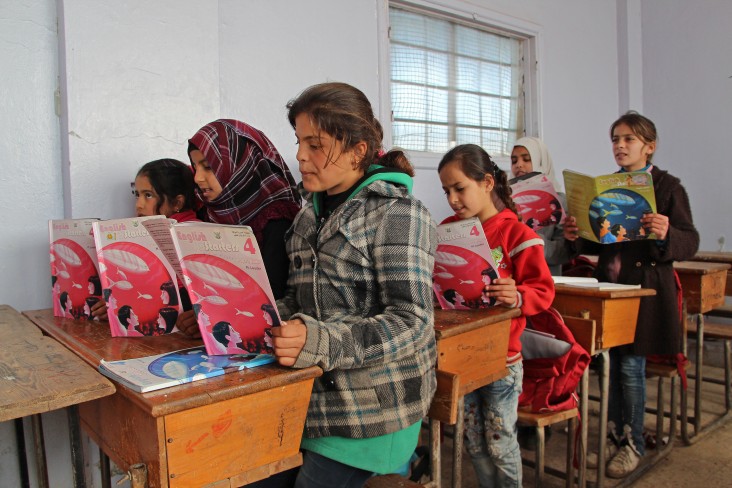Speeches Shim

Since 2011, the U.S. Government has delivered more than $12 billion in humanitarian and stabilization assistance to the people of Syria. As a key element of U.S. policy, USAID aims to alleviate human suffering in Syria.
The United States is the leading donor of humanitarian assistance in response to the Syria crisis and has also provided more than $923 million in stabilization assistance, of which $343 million has been provided by USAID. Additionally, the United States has raised more than $300 million from coalition donors to support critical U.S.-led stabilization programs. USAID humanitarian assistance reaches more than 4.5 million Syrians every month across all of Syria’s 14 governorates. In addition, USAID food assistance reaches approximately 1.1 million refugees in neighboring countries each month.
- USAID stabilization programming supports three overarching US policy objectives:
- The enduring defeat of Islamic State of Iraq and Syria (ISIS).
- The removal of Iranian forces and proxies from Syria.
Implementation of UNSCR 2254: The United States will not provide any reconstruction funding to regime-held areas in Syria until it ceases to be a state sponsor of terrorism; does not threaten its neighbors; verifiably dismantles and surrenders its weapons of mass destruction; creates conditions for the safe, voluntary, and dignified return of refugees and internally displaced persons; and holds accountable those who have committed war crimes or crimes against humanity.
Our Stabilization Work
USAID ESSENTIAL SERVICES PROJECT: This 5-year project supports local partners to restore essential services, including water, electricity, health, and education; increase inclusive, accountable, and transparent governance; and revive local economies in the agriculture and energy sectors. These investments will increase communities’ abilities to withstand the shocks of conflict, prevent re-emergence of extremist groups like ISIS, counter influence of malign actors, support a political resolution to the conflict, and set the stage for voluntary, dignified return of internally displaced people and refugees to return to their homes.
USAID SYRIA LIVELIHOODS PROJECT: This 5-year project will help to mitigate the current economic crisis, revive livelihoods, and restore local economies by supporting restoration of professional livelihoods and skilled trades while strengthening economic governance.
SUPPORTING LIVELIHOODS IN SYRIA (SLS): This project improves household-level food security and strengthens economic resilience in targeted communities. Interventions focus on agricultural and livestock production, market access, water management, irrigation, and sustainable land techniques to create livelihoods critical for food security. Working jointly with USAID’s Bureau for Humanitarian Assistance, SLS blends the speed of humanitarian assistance with the longer-term focus of development assistance. SLS has helped thousands of farmers with everything from animal feed and vaccinations to drip irrigation systems, with many programs directed toward women-led households. Recently, SLS provided 4,500 farmers in Deir-Ez Zor with farming equipment and 1,900 farmers with veterinary services.
ACCOUNTABILITY AND RESEARCH TEAM (ART): ART is a 5-year contract that will provide third-party monitoring, research and analysis for all of USAID's resilience and stabilization programs in Syria. The activity will also provide independent research and analysis services to inform USAID's strategy, project, and activity design and implementation. ART will increase USAID's understanding of the outputs, progress, challenges, successes, and lessons learned from our assistance efforts in Syria.
SKILLS TRAINING FOR CONFLICT-AFFECTED VULNERABLE COMMUNITIES: Through a $1.2 million grant, local Syrian organization, the Greek Patriarchate of Antioch - Department of Ecumenical Relations (GOPA-DERD) provides market-relevant vocational training and business start-up support to up to 600 people from vulnerable communities, including religious and ethnic minorities.
SYRIA RECOVERY TRUST FUND (SRTF): SRTF is a multi-donor funding mechanism supported by fourteen countries. Contributions finance essential services and early recovery programming in critical sectors including health, electricity, water, agriculture and food security, education, and waste management benefiting over 8 million Syrians. The USG’s contribution of $60 million to date has leveraged over $300 million in other donor contributions. SRTF projects continue to make positive impacts on the lives of Syrians. In the last six months 2,323 farmers in eight co-ops in Raqqa received 1,803 MT of treated wheat seeds, fertilizer, heavy equipment and other inputs; three new bakeries in northern Aleppo countryside became fully operational producing on average 7000 to 8000 loaves per hour (per bakery) each day serving approximately 30,000 beneficiaries per bakery/day; and seven new primary health care facilities treated over 80,000 patients. All the health care facilities are being outfitted to support Raqqa’s COVID response.
Contact
Syria Desk
U.S. Agency for International Development
1300 Pennsylvania Avenue, NW
Washington, DC, USA 20523
Email: usaidsyriadesk@usaid.gov

Comment
Make a general inquiry or suggest an improvement.